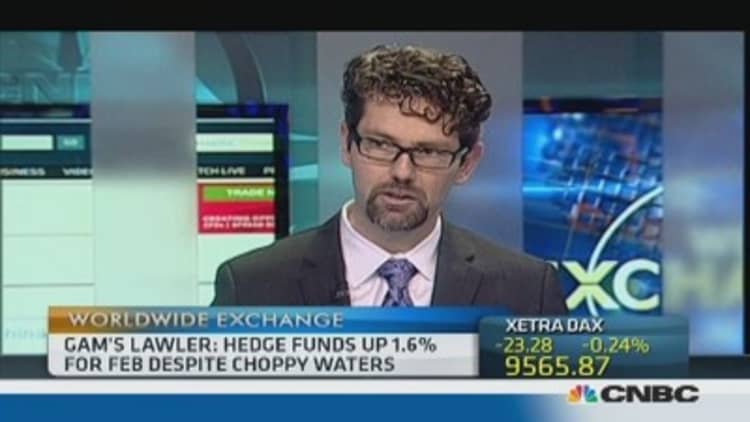It's a function of human nature that people prefer taking risk when they see others being rewarded for doing so. The behavior holds particularly true when it comes to the stock market.
Stocks are about the only thing that people don't want to buy on sale," said Mark Cortazzo, certified financial planner and senior partner at MACRO Consulting Group. "Back in 2009, when the environment was a lot less risky than today, people didn't want to take risk. Now, when there's much more risk in the market, people want to take on more risk," he said. "It's counterintuitive."
And it is potentially catastrophic to your investment portfolio, financial advisors say.
With the S&P 500 index up more than 30 percent last year—having nearly tripled since bottoming out in May 2009—risk in the stock market has risen dramatically in the last five years. Plenty of individual investors, however, are eager to either get into the market—if they feel they've missed the boat—or let the good times roll despite the mounting risk of an arguably overdue correction in the market.
(Read more: Spoiled for investment choice? Less is much more)
"A market run like this is a bit like financial pornography. It's shiny and distracting," Cortazzo said.
"People might be able to achieve their wants by being more aggressive, but they also risk not being able to meet their financial needs," he added. "I try to put these things in perspective for them."

Financial advisors, as a rule, are all about providing perspective, and most are trying to talk their more aggressive clients out of increasing risk levels in hopes of capturing higher returns.
Tim Maurer, certified financial planner and director of personal finance at the BAM Alliance, has some advice for investors who rode the U.S. stock market up last year with a heavy exposure to domestic stocks: Congratulate yourself and take some money off the table.
(Read more: The world is the savvy investor's oyster)
"I remind them that you almost never get 30 percent annual returns back to back in a market," Maurer said. While he isn't necessarily expecting a big decline in the market, Maurer reminds clients that the last 15 years have been among the most volatile in the history of the market.
"Very few people, no matter how aggressive they are, can comfortably endure a 50 percent decline in their investment portfolio," he said.
Like virtually all financial planners, Maurer believes in the value of a diversified investment portfolio. While investors were not rewarded for diversifying last year—as a wide swath of the bond market posted negative returns, and U.S. stocks significantly outperformed most other equity markets around the world—the long-term value of diversification remains intact, he said.
I'm not Burger King. If you become a client, you don't get it your way.Ric Edelmanchairman and CEO, Edelman Financial Services
Maurer never recommends a portfolio of 100 percent stocks; if investors insist on investing only in equities, he advises them to at least diversify within the asset class.
"Small-cap and international stocks might be more volatile than large-cap domestic stocks, but adding them into the mix for an investor only in large-cap domestic stocks can reduce overall volatility in their portfolio," he said.
Ric Edelman, who runs one of the largest registered investment advisor firms in the country, takes a hard line with clients looking to chase higher returns.
"We have a strict policy with clients," said Edelman, chairman and CEO of Edelman Financial Services. "If they come to us with investment ideas and expect us to act on them, the relationship is over.
(Read more: Take the long view for financial success)
"I'm not Burger King," he added. "If you become a client, you don't get it your way."
Edelman suggested that advisors who cater to clients' gut feelings about the market are doing them no favors.
"It's not serving the client's best interests [and] will result in higher turnover, higher costs, greater risks and, ultimately, lower returns," he said. "I change allocations for clients because of a change in their financial circumstances—not because of what's happening in the market."
When stock indexes are posting 30 percent returns in a year, the job of keeping clients' expectations reasonable gets all the more difficult. "At the beginning of last year, most people would have taken a guaranteed 10 percent return, and now they're disappointed if they had a 15 percent return," Cortazzo said. "It's the behavioral science aspect of this."
(Read more: Investors fearful, fantasizing in 2014)
Cortazzo continues to advise all his clients—including the most aggressive—to stick to their financial plans, regardless of how they view the markets. The downside of dialing up the risk when markets are hot can be painful.
"It comes back to realizing how this can affect your life," he said. "People have to understand what chasing higher rates of return can mean to their financial security and achieving their goals."
—Andrew Osterland, Special to CNBC.com.




